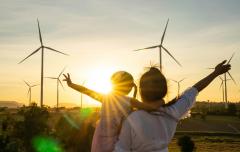What the world needs now
Everyone in this world needs access to modern energy sources to manage their everyday lives and to thrive economically. our current energy system based on fossil fuels is inequitable and unsustain- able. We urgently need to reduce our energy-relat- ed carbon dioxide emissions that threaten our prosperity and security.
Reports estimate that one person in five still lacks electricity. that is 1.3 billion people – men, women and children. About twice that number, 3 billion people, rely on traditional sources of energy, such as wood, coal, charcoal or animal waste for cooking and heating. That is nearly forty percent of the world’s population.
The opposite is true in the developed world. essential services such as access to light, fuel for heating and cooking purposes are available. instead, there is waste and pollution. Inefficient, carbon intensive energy use destroys our economic productivity and contributes immensely to the changes in climate conditions causing extreme weather events.
We must confront these two challenges. We must ensure that the “energy poor” have access to clean, reliable, affordable and modern energy services. in the industrialized world, we need to turn down the thermostat and make improvements in energy efficiency and in the use of renewables.
To achieve this, we require a sustained political focus. We must move these issues up our political and development agendas and make them a top priority.
Both challenges can be solved. Providing global energy access to sustainable energy is not a luxury, but a necessity. it will help to lift millions out of poverty. We can do it while making progress on preventing dangerous climate change, by relying more strongly on cleaner sources of energy, including renewable energy and low-greenhouse gas emitting fossil fuel technologies.
As united nations secretary-General Ban Ki-moon says, “energy is the golden thread that connects economic growth, increases social equity, and an environment that allows the world to thrive.” to address our huge current energy challenges he has launched his Sustainable Energy For All initiative.
Sustainable Energy For All seeks to meet three ambitious and achievable objectives: provide universal access to modern energy services, double the global rate of improvement in energy efficiency and double the share of renewable energy in the global energy mix.
Governments around the world have endorsed sustainable energy for All. Countries in Africa, the european union and the small island Developing states have pledged their support and are committed to ensuring the three goals are met by establishing clear national targets and implementing national policies. They are also committed to supporting bottom-up approaches.
Recently, the governments of tanzania, mexico and norway led a global conversation online and in various locations around the world on the importance of energy and its inclusion into the post-2015 development agenda.
After a successful year of sustainable energy for all in 2012, the un General Assembly has unanimously designated the decade 2014 – 2024 as the Decade of sustainable energy for All.
 Issue 3, 2013 Securîty Communîty
The OSCE Magazine
PDF
Issue 3, 2013 Securîty Communîty
The OSCE Magazine
PDF
Energy for peace
not only do we need to focus on energy for development, we should also focus on energy for peace. too often, energy has been a source of conflict. the potential risks of getting our energy policies wrong are considerable; numerous conflicts have occurred as a result of competition for resources. You simply have to open a newspaper or switch on the television to see the close relationship between energy and security. And yet there are few multi-lateral arrangements to defuse energy-related conflicts, or to promote confidence-building measures. this is a shortcoming that we need to address so that the world’s finite resources can fuel development rather than conflict. Issue 3, 2013 Securîty Communîty
The OSCE Magazine
PDF
Issue 3, 2013 Securîty Communîty
The OSCE Magazine
PDF



